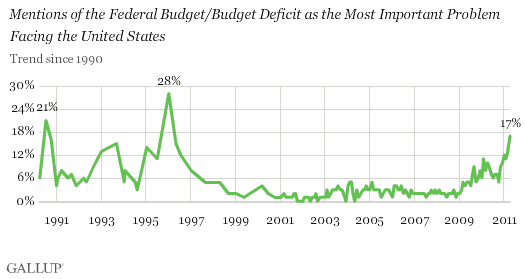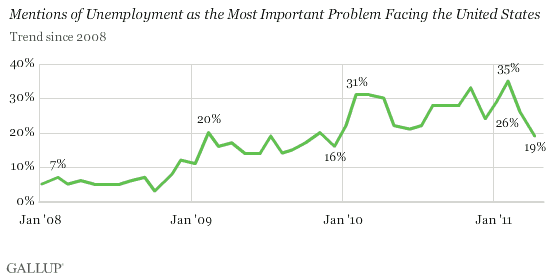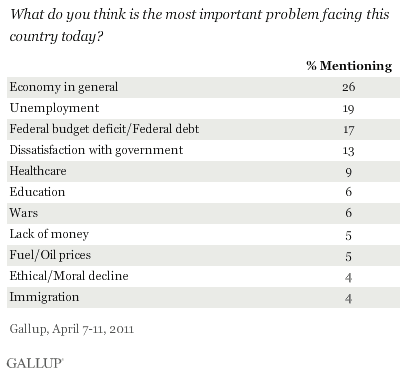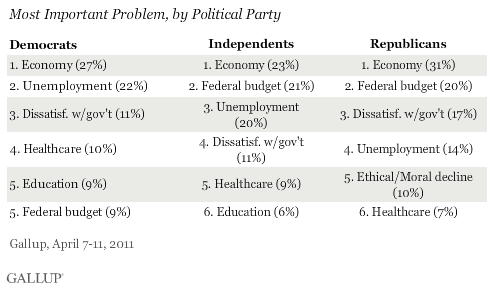PRINCETON, NJ -- President Obama releases his plan to curb the federal deficit with Americans' concern about the federal budget and deficit growing to its highest level in 15 years. Currently, 17% say it is the most important problem facing the country, the highest Gallup has measured since it began asking the "most important problem" question on a monthly basis in 2001, and the highest in any Gallup poll since January 1996.

The April 7-11 poll was conducted in the final days of negotiations that led to a budget agreement late Friday night that averted a government shutdown, and in the initial days after the deal was reached. Americans were just as likely to mention the budget as the most important problem on Saturday, Sunday, and Monday as they were on Thursday and Friday.
Americans' increasing likelihood to cite the federal budget as the most important problem could be a function of its status as a dominant issue in the news media. Gallup has historically found that it ranks low on the most important problem list, but it has risen at times when the president and Congress make it a major focus. This occurred during the 1990 negotiations on the budget between President George H.W. Bush and congressional Democrats on a plan to reduce the deficit that led to Bush's breaking his campaign promise not to raise taxes. It also happened during the budget standoff between President Bill Clinton and the Republicans in Congress in 1995 and 1996.
Unemployment Concerns Dropping, Economy Still the Leading Problem
At the same time that Americans' concerns about the budget and deficit are increasing, Americans are less likely to mention unemployment as the most important problem. Mentions of unemployment, at 19%, are down from 26% last month and the lowest since December 2009. This coincides with the more positive numbers on jobs and unemployment released by the government earlier this month.

Neither unemployment nor the budget is Americans' top overall concern. That distinction belongs to the economy, by a significant margin over any other issue. The economy has placed first or second on the list each month since February 2008.
Americans' other major concerns include dissatisfaction with government, healthcare, education, and the wars. Despite the continuing increase in the price of gas, 5% of Americans mention fuel prices, essentially the same as last month (6%), and well below the percentage who have done so in other times when gas prices were high.

Democrats Less Concerned About the Budget
Republicans and Democrats mention the economy more frequently than any other issue as the nation's most important problem. Among independents, however, the budget and unemployment rank about as high as the economy.
Independents and Republicans are both twice as likely as Democrats to say the budget is the most important problem. In turn, Republicans are less likely than Democrats and independents to view unemployment as the top problem.

All three party groups rate dissatisfaction with government as one of the most important problems for the United States, though Republicans are most likely to do so.
Republicans differ from the other party groups in viewing moral and ethical decline as an urgent problem -- 10% of Republicans mention this issue, compared with 2% of Democrats and independents.
Implications
Even though President Obama and the Republicans in Congress have agreed on a budget deal to avert a government shutdown, the issue will remain in the news now that the president has outlined his plan for addressing the deficit. In addition to that, the two sides will be grappling with legislation to raise the federal debt ceiling, which is projected to be exceeded in the coming weeks, in addition to working on the fiscal year 2012 budget.
Thus, the budget is likely to remain a top concern for Americans in the coming months, and could very well be a key policy issue in the 2012 presidential election campaign.
Even so, the health of the economy remains Americans' top concern overall and likely will continue to rate as a top problem until it improves significantly.
Survey Methods
Results for this Gallup poll are based on telephone interviews conducted April 7-11, 2011, with a random sample of 1,077 adults, aged 18 and older, living in all 50 U.S. states and the District of Columbia.
For results based on the total sample of national adults, one can say with 95% confidence that the maximum margin of sampling error is ±4 percentage points.
Interviews are conducted with respondents on landline telephones and cellular phones, with interviews conducted in Spanish for respondents who are primarily Spanish-speaking. Each sample includes a minimum quota of 400 cell phone respondents and 600 landline respondents per 1,000 national adults, with additional minimum quotas among landline respondents for gender within region. Landline telephone numbers are chosen at random among listed telephone numbers. Cell phones numbers are selected using random digit dial methods. Landline respondents are chosen at random within each household on the basis of which member had the most recent birthday.
Samples are weighted by gender, age, race, Hispanic ethnicity, education, region, adults in the household, and phone status (cell phone-only/landline only/both, cell phone mostly, and having an unlisted landline number). Demographic weighting targets are based on the March 2010 Current Population Survey figures for the aged 18 and older non-institutionalized population living in U.S. telephone households. All reported margins of sampling error include the computed design effects for weighting and sample design.
In addition to sampling error, question wording and practical difficulties in conducting surveys can introduce error or bias into the findings of public opinion polls.
View methodology, full question results, and trend data.
For more details on Gallup's polling methodology, visit www.gallup.com.
